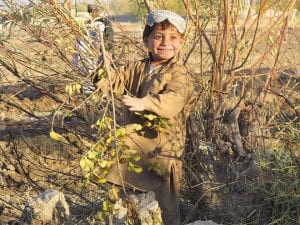Mike Ross graduated from Cook County High School in 1989, not sure what to do with his life. He knew he wasn’t ready for college and he was looking for some adventure. He found it by enlisting in the U.S. Army.
Ross joined the Army in the fall of 1989 and served for four and a half years as a combat engineer—two years in Bremerhaven, Germany, which he really enjoyed. However, the first Gulf War interrupted his time in Germany. Ross deployed from Germany to Iraq for six months during Desert Storm.
Ross left active duty after his enlistment but continued to serve in the U.S. Army Reserve, training on weekends with the 309th Engineer Company in Brainerd, Minnesota.
After leaving active duty, Ross attended Vermilion Community College. He eventually returned to Lutsen and got a job at LTV Mining in 1996. He started as a parttime summer employee and eventually was offered a full-time position. He now works as an instrument/lab/environmental specialist at the same facility, which is now owned by Minnesota Power.

The crest for SFC Ross’s unit shows the traditional castle of the combat engineer being defended by a guardian angel, representing the men of the 309th Engineer Company.
Ross was deployed with the 309th Engineers on a stateside deployment at Fort McCoy in 2005-06, assisting units that were mobilizing. And then, before retiring from the Army Reserve, he served a final deployment to Afghanistan.
“I set foot on the ground in early October 2010 and left there August 13, 2011,” said Sergeant First Class Mike Ross in an interview in his office at Taconite Harbor.
Ross is very matter-of-fact when asked just what a combat engineer does in Afghanistan. His job was “route clearance.” What exactly does that mean? “Bomb patrol,” replied Ross.
Ross spent his days in Afghanistan traveling the roads in an armored vehicle, looking for improvised explosive devices (IEDs)—roadside bombs. Ross said his unit used visual indicators and alarms to locate IEDs. The task was not easy as the enemy was always adapting, changing the style of the devices.
Were there times that the route clearance vehicles didn’t see the IEDs in time? Yes, said Ross, his unit had a 50 percent find versus detonation rate. However, he added, “I only got ‘blown up’ once. I almost made it through the year.”
Ross was not injured in the explosion, because, he said, “We had the proper equipment. A regular truck wouldn’t fare well. There are all kinds of technology to divert the blast and it’s always being modified.”
The bomb patrol worked with explosive ordnance disposal (EOD) teams. Once Ross’s team located an IED, the EOD team would “render it safe.” Asked what that means, Ross explained that the explosive disposal team either dismantled the device—or blew it up.
In addition to searching for IEDs, Ross and his crew had to worry about being shot at, something that could happen at any time. “We had engagements,” he said. “But being that we didn’t see the people laying these things, most fire was from far away.”
In Afghanistan, Ross was assigned to Camp Leatherneck in the Helmand Province in the high desert with the U.S. Marines and at Camp Dwyer in the Garmsir District. Did Ross, an Army sergeant, get along with the Marines? He grinned and said, “Yes, they tend to be more out front, more hardcore. But they thought we were crazy.”
Asked if he ever thought when he enlisted back in 1989 that he would be driving an armored vehicle, searching out explosives, Ross said no. “I never expected this kind of mission.”
He certainly never expected to be a Bronze Star recipient. Ross doesn’t volunteer that information readily, but asked if a friend is correct that he received this honor, he said yes, he received it for “successful missions.” He said the narrative for the medal was “fantastic” and included the statistics of his unit—how many IEDs were found, how much fuel, how many parts and pieces of equipment. The unit led 30 medical evacuations (medevac).
“We were recognized for the number of lives saved,” said Ross. “When my guys would get down, I would tell them, we’re not going out there to get blown up. We are the protectors. We are out there to find these things, to make them go away. We kind of succeeded. I’m very proud of my guys.”
Ross said the Afghani people he interacted with appreciated the work the U.S. military was doing. “When we would roll into towns, they were usually glad to see us. I have the greatest respect for them. They have a hard life—they live in mud huts; there is all kinds of disease; they struggle trying to grow crops,” he said. “It makes you realize how lucky you are to live in the United States.”
While Ross was gone, his family—wife Kelli and daughter Ashley—anxiously waited for his return to Lutsen, as did Kelli’s other children—Steve, Darcy and Kori. Steve came home to Lutsen to help out while Ross was away. Ross noted that it is hard to have a family member deployed. He said he wasn’t sure if it helped, or made it worse, that Kelli is all too familiar with what he was going through. She served in the military for 16 years. “She knew where I was; what I was doing,” he said.
Knowing what he knows now, the Cook County News-Herald asked Ross if he would recommend military service to a young person. Ross said yes. “Yes, it’s brought benefits to my life. I wasn’t ready to go to college. I wanted to see the world. I saw the world—good and bad.”



Loading Comments